
By all accounts Chengdu, the fifth largest city in China with a population of 14 million, has a laid-back ambiance with a relaxing teahouse culture, a cool nightlife that includes craft-beer bars and trendy clubs, amazing food (if you like your food super-hot), and Sichuan opera performances. It sounds awesome doesn’t it? I think I should go there. Oh wait . . . . I did go there. I wasn’t there long enough to discover the teahouse culture or the hip clubs and bars, or the easy-going atmosphere, but I did catch a little of what Chengdu has to offer.
We strolled around the ubiquitous People’s Park. Every city in China has a People’s Park and they are much used by the local population. In Chengdu it’s no different. The Chengdu People’s Park is a large elegant green space in the centre of the city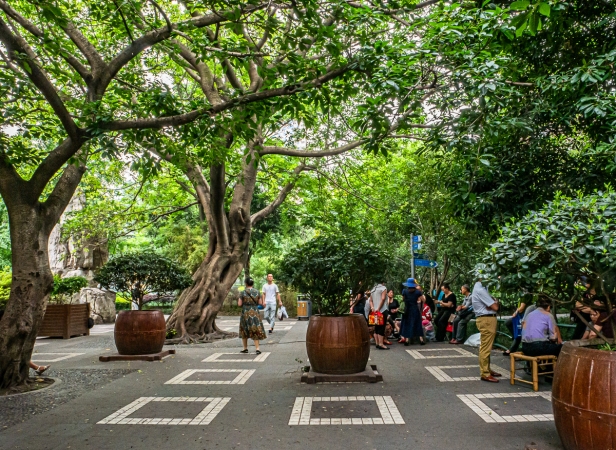
with teahouses, lotus ponds, walking paths, and boating on the lake.


The park is where the locals join groups to sing and play traditional opera, or practice Tai Chi, ballroom dancing, ribbon twirling, or aerobics, or get together with friends to sing karaoke, or play cards
or Chinese Chess.
The People’s Parks are where everyone congregates to gossip and chat, to catch up on the news and each other’s lives, or to try to find a husband for their daughter or a wife for their son. It’s the Chinese equivalent of online dating, except it’s done by the parents: of daughters who are still single at the age of 28 and sadly considered “leftovers” such is the pressure in China for people to marry. And of sons, where the situation is perhaps a little more urgent.
Because in the past so very many female babies were aborted there is a huge surplus of young men. I’m mildly appalled, and admittedly mildly amused by this. What did they think would happen? Perhaps all these surplus men could swallow their pride and marry an over-the-hill 28-year-old spinster. If she would want to marry at all of course. There is a movement now among young women who are realising that, despite pressure from parents and society, they actually don’t have to.
These days in China you need to be a pretty special young man to merit a wife. Does he have a good education? A good job? A car? An apartment? And in Chengdu, where it’s apparently easy to get an apartment, personality and character are also considered. These parents are advertising their children in hopes of finding a spouse for their stubborn daughter or their surplus son.
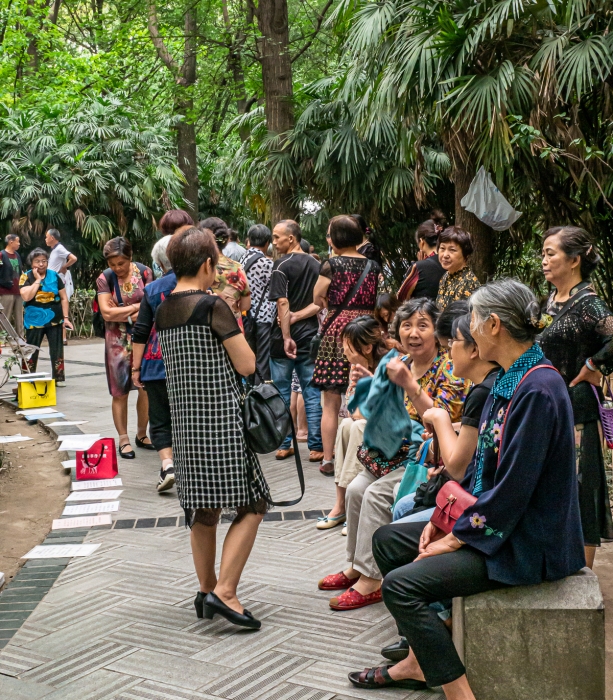
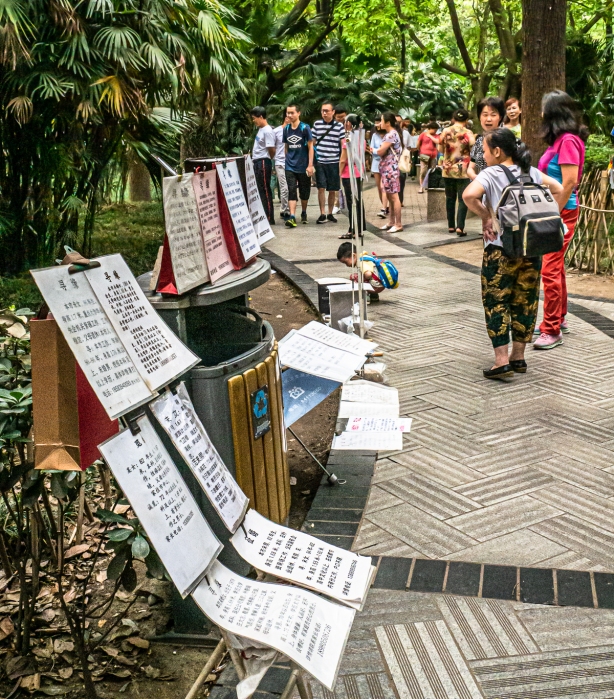
Later we take a local bus from our hotel. It’s a long ride – nine stops and Peter, our guide, gives us warning that the next one is ours. A little before dusk we walk along the busy leafy streets of the inner city

to Jinli Snack Street in a restored part of Old Chengdu. We’re there for dinner; it’s the night I find drool-worthy battered-deep-fried spiralled potato. Bhakti, Thea and I go exploring. Jinli, it turns out, is not just one street of take-out food stalls,
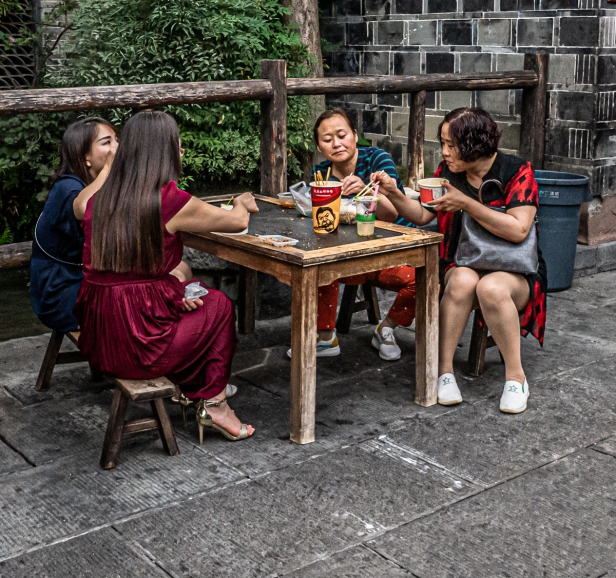
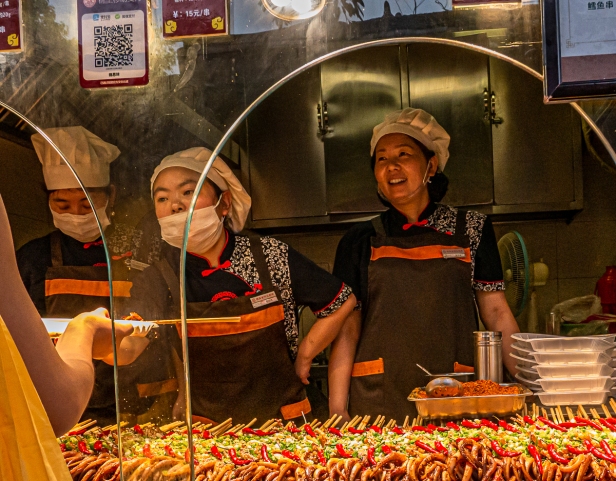
but a labyrinth of red-lanterned streets


along which numerous small shops and stalls selling souvenirs and mysteries

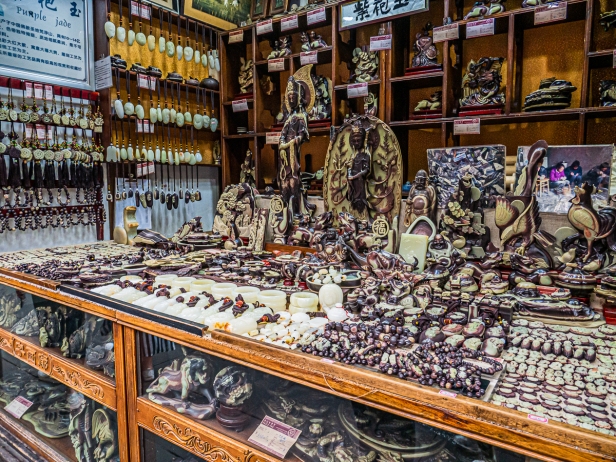


compete for customers from the crowds who are mainly there it seems to get their food and end up here,
a large open space where everyone can gather to drink beer or tea, chew the fat (hopefully not literally) or disappear into their phones. This is the Chengdu I’d read about.
Oh yeah. We also saw a few pandas in Chengdu. Just one or two. Or three or four. Oh dozens actually. Nothing much. Just dozens of pandas eating sticks of bamboo, rolling around playing with each other, climbing trees, sleeping. Less than ten feet away. It was nothing really. You didn’t miss anything.
The Chengdu Research Base of Giant Panda Breeding covers 247 acres, 96% of which is green space. It has been developed to imitate the natural habitat of these unique bears, and create the best possible environment for rearing and breeding.
The non-profit research centre is concerned with the protection and breeding of China’s endangered wild animals and has been remarkably successful at breeding pandas. A large part of the acreage at the Base is dedicated space to accustom the bears to their natural habitat so they can be released back into the wild. As of 2017 over 170 Giant Pandas are housed there.
It is estimated there are about 2000 pandas in the wild, 70% of them in Sichuan. They are considered vulnerable but no longer endangered.
I have to say that our first introduction to the Base is not good. Before you get to the open spaces where the majority of the pandas live you pass by some indoor housing. I’m appalled to see two different rooms, one with one panda and another with two, where there’s so much poop on the floors that the bears are walking in it. I don’t know why these bears are being kept isolated: perhaps illness, perhaps something to do with the breeding program. Whatever the reason I’m dismayed at the state of their housing. Perhaps, because we’ve arrived quite early in the day the enclosures have not yet been cleaned. One can only hope so.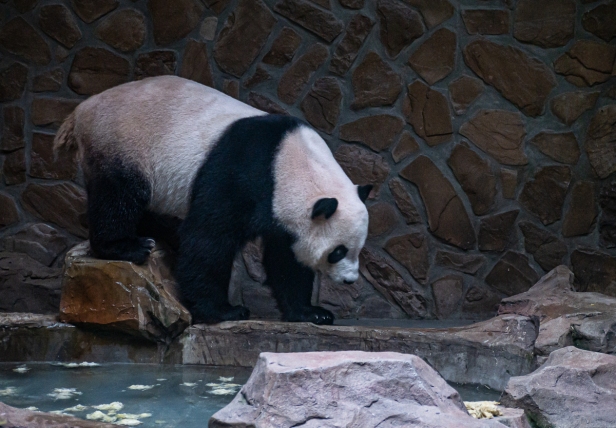
Things improve greatly after this. The open-air enclosures are huge, covering many acres. We arrive at breakfast time. The bears are fed great mounds of sticks from a specific species of bamboo, and they are fed close to the fences so they can be easily seen.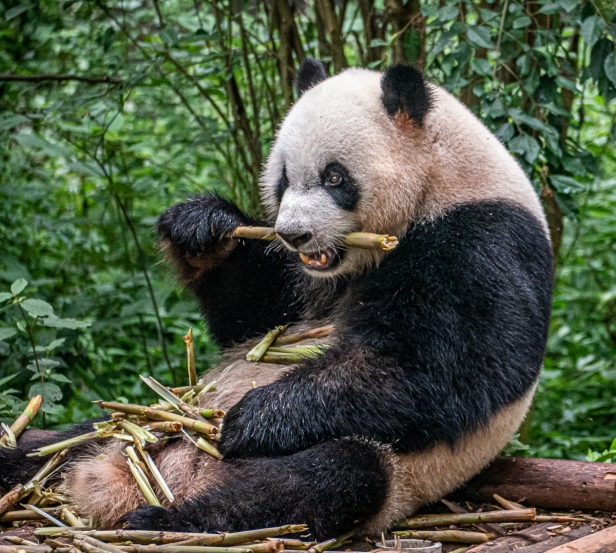
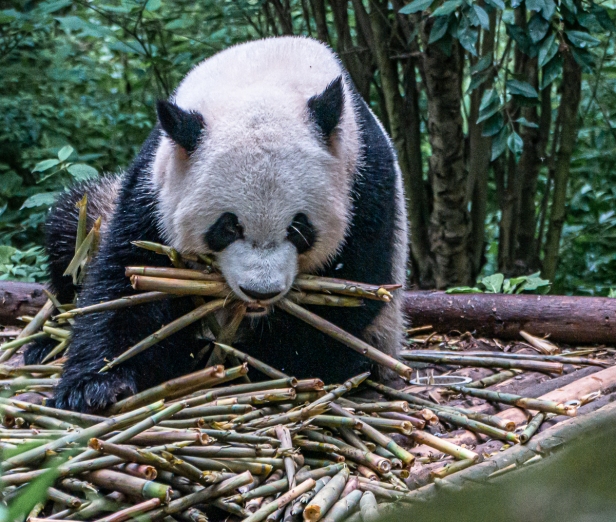
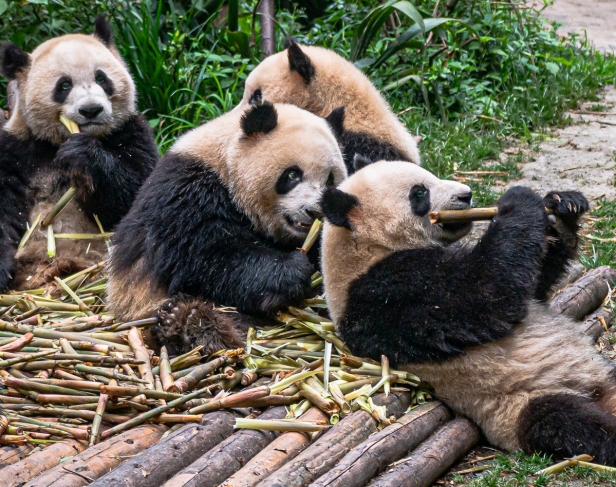
Of course I’m immediately completely captivated. There’s nothing in the world quite like them and I wonder why a panda makes one’s heart melt whereas a grizzly fills it with trepidation and awe. Perhaps I lived too long in the Canadian wilderness and heard too many scary bear stories. And have a few of my own.
Pandas are like koalas and sloths. They’re basically lazy and don’t do anything much but eat and sleep. This one couldn’t even be bothered to sit up to eat.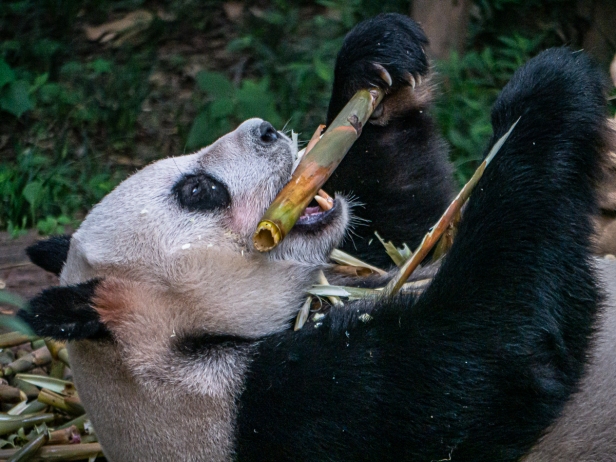
When they’ve finished eating they climb into the trees and have a little nap.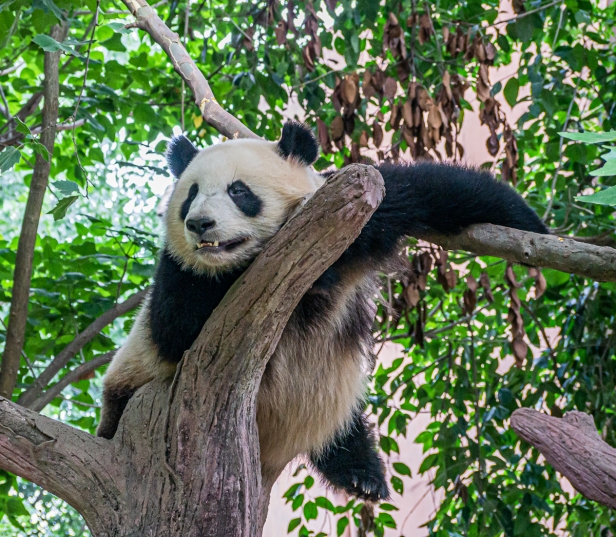
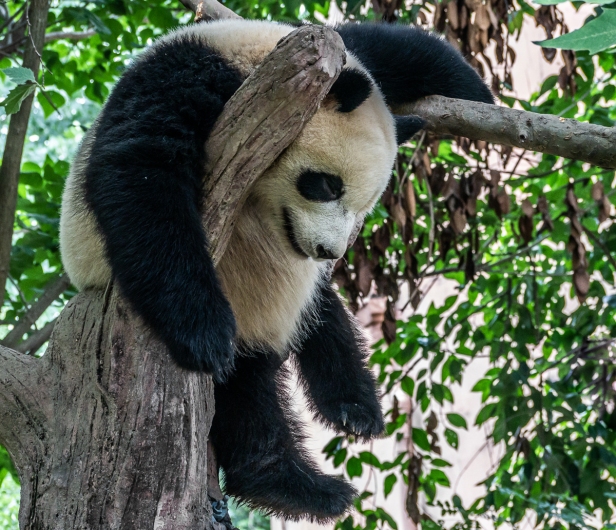
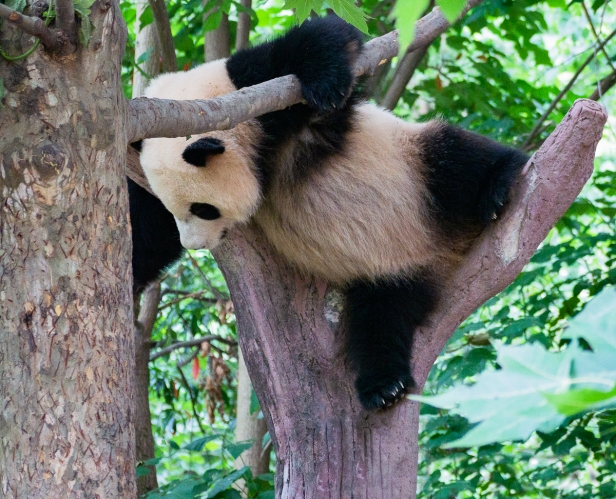
The research base also houses red pandas, which are not pandas at all. They had previously been placed in the bear and racoon families, but now are the only living species of the family Ailuridae. So neither racoon nor bear but just as cute.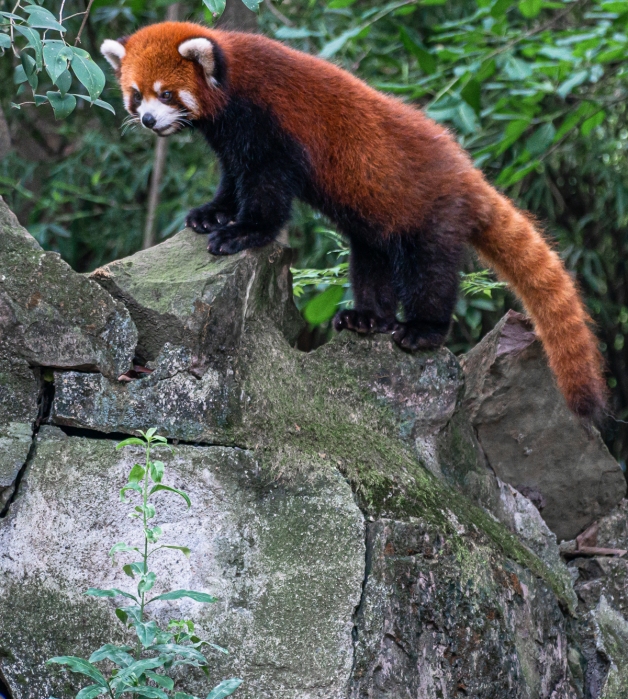
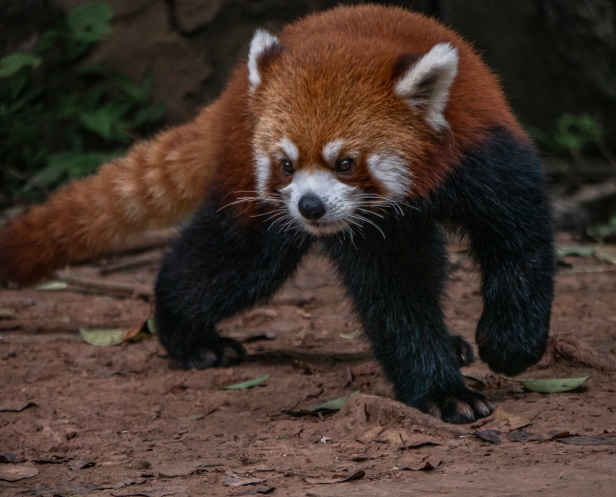
There is a small lake, and a colony of black-necked cranes, and two pairs of Australian black swans.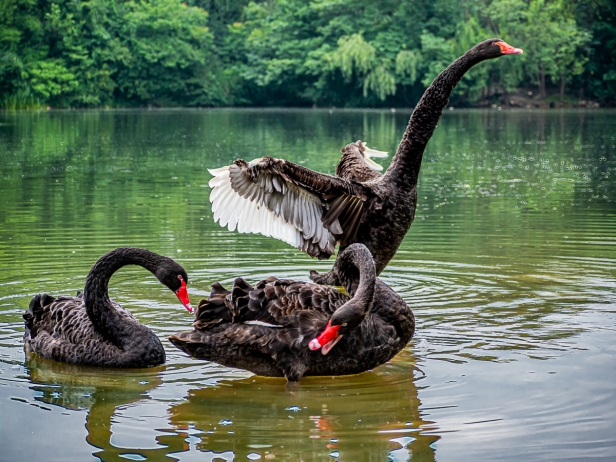
It’s a pretty lake surrounded by greenery, and the swans are all coal-black elegance, but there’s no doubt that it’s the pandas that are the stars of this show. If I wasn’t in Chengdu long enough to really get a feel for the relaxed ambiance of the city I certainly got a feel for it at the panda base. You don’t get much more relaxed than a well-fed panda.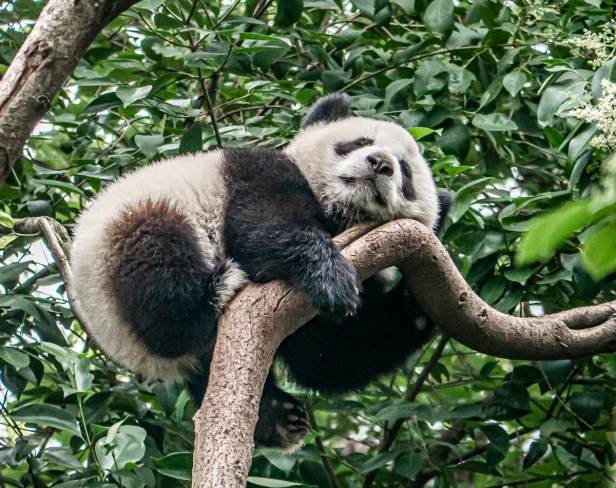
Next post: Sichuan opera – truly one of the most spectacular things I’ve ever seen even if much was lost in translation.
All words and images by Alison Louise Armstrong unless otherwise noted
© Alison Louise Armstrong and Adventures in Wonderland – a pilgrimage of the heart, 2010-2019.

You got my attention! 🙂 the pands are cute but the story of the parents advertising their children is even more interesting! And the pictures are very nice, ciao
LikeLiked by 3 people
Thank you so much Mafalda. I too was fascinated with the parents advertising their children. I think it is done in many cultures – but more behind-the-scenes. In China it’s so out in the open! Loved the pandas – yes, very cute!
Alison
LikeLike
Ah the pandas! We loved watching them frolic and eat and sleep and tumble too. (Glad we missed the indoor spaces which sounds upsetting.) We stopped in Chengdu en route from Asia to the U.S. earlier this year. It was an overall very enjoyable layover.
Your photos are fantastic! Love all the sleepy close ups in the trees.
Peta
LikeLiked by 2 people
Thanks so much Peta. I couldn’t believe how the pandas would drape themselves in the trees and then fall asleep – in the seemingly most awkward positions.
I certainly found the indoor spaces disturbing. I was pretty much aghast at the state of the enclosures. It was like a bad zoo. I can only hope that they are at leased hosed out once a day, though from what I saw more that once a day would really be necessary. Once we got past the indoor spaces it was wonderful – as you know. And the perfect place to go when you have a short layover.
Alison
LikeLike
Great blog post! How did you get so many images of the ‘dating game’ in the park? We tried, and everyone waved us away, we got one with a long-range lens.
LikeLiked by 2 people
Thank you so much Mark. I was with a small group of westerners and a Chinese guide who explained to us what it was. We were all in amongst the local people with all their signs advertising their children. We all took photos with no problem for a couple of minutes then someone spoke to Peter about it so he told us to stop because they didn’t like it. It was no big deal at all, perhaps because we had a Chinese guide with us. IDK. Were you in Chengdu or some other Chinese city?
Alison
LikeLike
The pandas are adorable and your pictures are fabulous as always. You certainly captured the essence of these creatures. And as always, I got a good feel for the population of Chengdu from this post. Advertising for a suitable mate for your grown child is priceless but not always a bad idea when you see what some end up with. LOL
LikeLiked by 2 people
Thank you so much Darlene. I enjoyed what saw of Chengdu even though it was a brief visit. The highlights were the pandas, and the opera (next post).
I can’t imagine what it would be like if my parents did that! I think I’d be cringing, but it’s a pretty accepted practice in China.
Alison
LikeLiked by 1 person
Oh my goodness, this is my dream! Pandas are my favorite animal and I really want to see them in the wild.
LikeLiked by 2 people
It was really special seeing the pandas. I hope you get to see them one day!
Alison
LikeLiked by 1 person
What is is with our crazy race? We let ourselves be manipulated into mad situations by politicians and dictators and then suffer the consequences. Such an enormous and fascinating country! 🙂 🙂
LikeLiked by 2 people
I think we are a pretty crazy lot, but the situation with the surplus men was not created by the government. The one child per family came from the government. And legal abortion came from the government. China realized, rightly, that they really had to curb population growth. The aborting of large numbers of female fetuses came from a universal patriarchy which was as alive and well in China as everywhere else in the world. Boy children are better than girl children dontcha know. And so it goes – the world over. Yes, stupid crazy.
It is indeed a fascinating country.
Alison
LikeLiked by 1 person
alison good thing you put the pandas at the end of the post because really who can resist them and in such numbers. The Calgary Zoo currently has four pandas on loan from China in an effort to promote panda conservation. The two younger pandas are heading back home next month. Your photos are glorious and I love the ones in the trees especially.
As to parents shopping for a spouse for their child I’m not sure if I am amused or horrified. What a situation the country has created having so few females compared to males.
LikeLiked by 2 people
Thanks so much Sue. I too loved seeing the pandas in the trees – so cute and comical.
I think I’d be cringing in horror if my parents tried to shop me around, especially in public! but it is accepted practice in China.
I do know that in some circumstances people are allowed to have two children now so maybe more girls survive gestation these days. Stoopid patriarchy!
Alison
LikeLiked by 1 person
I was shocked by the parents advertising their children’s virtues to potential spouses. Made me wonder what my parents would say about me!! A great post, even without the pandas!
LikeLiked by 2 people
Thanks so much Tracey. Yeah, I too wonder what my parents would say about me – I think it would have been what a sweet smart good girl I am, and it couldn’t be further from the truth. The older I got the more my true colours showed. I’ll own the smart bit, but sweet and good not so much. Glad you enjoyed the post.
Alison
LikeLike
I’ll follow your lead and leave my panda comments for the end! Even with your short time in Chengdu, I think you managed to see and capture a TON of the personality of this city. They definitely sell their city as a chill place (we felt it too as we sat around at several times and places drinking tea and people-watching), but you show us so much vibrant life here also – in the parks, in Jinli Street, etc. I saw none of the potential mate advertising! Thinking back, it was probably because it was raining every time we were in People’s Park. Although the scourge of baby girl abortions in China is horrifying, the matchmaking itself amuses and fascinates me. I can’t bring myself to judge that tradition, still alive and well in parts of the world after so many centuries, even in places without a male-female mismatch. (Not that you were doing that either.)
Awwwww, the pandas! They are just so cuddly and fluffy and lazy and lovable. For what it’s worth, we had a tour of some of the indoors (including the newborn area – talk about adorable!), and it was totally clean. As you note, maybe they hadn’t mucked out the area you saw yet, or maybe they knew our group was coming and cleaned up just for us. The scene you encountered would have bothered me too – glad I did not have that image mar my visit a little. Overall, I was impressed with the facility and its mission. Thanks for the fantastic photos of these unique creatures!
LikeLiked by 2 people
Thanks so much Lexie. It sounds as if you enjoyed Chengdu, and I’m glad you think I caught the atmosphere of it – yes a ton of vibrant life that’s for sure. And I really enjoyed the whole Jinli area, and wish I’d had time to sit in teashops people watching.
I know parental match-making is world wide pretty much, and as old as time, but in China it’s so public! I guess that’s what surprised me most about it.
Maybe they’re catching up with the reality of the patriarchy. If you favour male over female you end up with a problem. Oops. I’m mildly curious to know if female fetuses are still aborted at the same rate these days as they were back in the 80’s. A quick look at wiki tells me that in rural areas there is still a strong preference for a son, but less so in the cities these days. Apparently sex-selective abortion was made illegal back in the 80’s but people did it anyway.
I am so happy, and not remotely surprised, to hear of your experience of the indoor spaces at the panda base. I’ve just had the impression that it’s a really successful and well-run place, so I guess they were just behind on hosing out those enclosures. At the same time I felt I had to write about what I saw.
Alison
LikeLiked by 1 person
Quite a Pandamonium Collection!
I love all your “people” candids – the chess players, the bicyclists – so many!
LikeLiked by 1 person
Thanks so much Michael. I do like to try to capture the people, just being people, same as us, and unique to themselves and to their culture. I find it fascinating.
Alison
LikeLiked by 1 person
FINALLY! I am obsessed with this post and the Pandas…your images are framed perfectly with beautiful editing across the board. My computer battery is about to die, but I will be back to read in detail later this weekend!! Cheers!
LikeLiked by 1 person
Thanks so much Pam. I’m glad you like the photos!
Alison
LikeLiked by 1 person
28 YO spinster. haha. Good for the new generation of women over there, changing this mindset, slowly but surely! I have an Indian friend who is the epitome of a modern and hip American princess – I love her dearly. She turned 30 3 years ago….soon after, she went to India with her parents – she hated the entire experience – she would rather the Four Seasons! On that trip, her parents put an ad in the paper for a husband for her. She was mortified – but had to deal with it because of traditions. She keeps trying to find an Indian man, but honestly would prefer an American. I know it’s tough for her. Thankful we have freedom to choose whomever we want to be with!
LikeLiked by 1 person
Oh I do feel for your friend! I’ve seen a documentary about this – about Indian parents desperate to marry off their US raised Indian son – and the whole trip to India to find him an Indian wife. It’s seems so absurd to me. We’re not all destined to marry or to marry young. Also it’s a bit unrealistic to raise a child in the US and then expect them to follow Indian traditions re marriage. I suspect things are changing in this arena too.
Alison
LikeLiked by 1 person
Yes, it has been really tough for her. You have reminded me I need to reach out see how she is doing. I think it has started to impact her self esteem – which I hate. I’ll look for that documentary! Sounds interesting.
LikeLiked by 1 person
I think I saw it on Netflix and I can’t find it there now. It was a kind of reality show around the story of this one guy (who I gathered has his own TV show or s’thing like that) and his (unsuccessful) trip to India with his parents to find a wife.
LikeLiked by 1 person
I love the critters and pandas 🐼 are so very adorable ❣️ I also enjoy seeing the group of men engaged in playing games…I see this often as I travel…your work is so rich and educative Alison I appreciate all your time and energy in composing your posts…also that I can revisit…and show my grandson those panda bears ☺️ have a wonderful day ~ 😄 hedy
LikeLiked by 1 person
Thank you so much Hedy for your kind words. So appreciated. I hope your grandson enjoys the pandas. May you be having a lovely day. Soggy here in Van but I will walk anyway!
Alison
LikeLike
Aren’t those pandas cute? Such a wow factor. I wished I had made it to Chengdu.
How did you find taking photographs at the ‘marriage market’??? I went to one in Shanghai but found people were very reluctant to have their photograph taken and actually were quite hostile. I took some, but very discreetly…
Lieve
LikeLiked by 1 person
The pandas were so cute. I never thought I’d see so many, and so close.
At the marriage market I was with a small group of westerners and our Chinese guide. He took us to it. We all just wandered around in amongst it looking, and taking pictures, and then after a few minutes someone complained to our guide so he told us to stop taking pictures. It didn’t seem like a big deal at all. He told us the reason they didn’t want us taking pictures but I’ve forgotten what it was.
Alison
LikeLike
I must admit I can’t remember either but I wonder whether it’s a ‘saving face’ issue. Marriage is still very important in Chinese society and having unmarried offspring of the ‘leftover age’ may be a social stigma…
Lieve
LikeLiked by 1 person
I had to laugh a little at the idea of a city of 14 million having a “laidback atmosphere”. Only in China. Gorgeous photos, as always. I can never get enough of that RED. I’m pleased to hear that the young women are realizing that they don’t have to get married to consider themselves a success at life. God, what an obnoxious, outdated idea. The pandas are cute (I love grizzlies, too!), but I’m more intrigued by that teahouse culture you mentioned. Too bad you didn’t have time to check it out. Thanks, as always, for the vibrant journey.
LikeLiked by 1 person
Thanks so much Julie. I too was a bit askance at the idea of a city that size being laidback and didn’t really believe it even though everywhere I looked online it was described that way. I suspect it means the centre around the park and Jinli and other nearby places where people (and tourists) congregate. I also suspect that someone wrote it (eg Lonely Planet) and everyone else followed along. I personally didn’t experience it having so little time in the city. For me the highlights were definitely the pandas (the most laidback thing I saw there) and the opera (next post).
I saw one video online that gave me hope, of an outdoor exhibition in Beijing of large framed photos of young women who’ve opted not to marry (at least for now anyway) and their parents were there with them and seemed to be accepting of their choice – though my understanding is that family, marriage, and the patriarchy are still pretty firmly entrenched in the Chinese culture.
I too would have liked to check out the teahouse culture – sipping tea and people watching there sounds like something I’d really enjoy.
Alison
LikeLike
Wow amazing to see the pandas so close! I bet it was pretty special. Beautiful photos as always Alison!
LikeLiked by 1 person
Thanks so much Nicole. The pandas were absolutely adorable! So glad I got to see them.
Alison
LikeLike
Haha…put Panda in the title and there’s no way you’ll skip this post. They are absolutely adorable and your photos are outstanding. I love the so-called red pandas too.
On a different note, what struck me about this post is that despite the size of the city (14 million, wow!) it appears that in many ways it retains a village feeling with all the parks and the people socializing, playing, matchmaking…I wonder if this is more true for the older generation? Maybe I have it wrong, but it does look very pleasant.
LikeLiked by 1 person
Thanks so much Caroline. I do think there’s a kind of village feel in the parts of Chengdu we went to, but maybe not so much out in those “villages” of high rises where most people live. And there’s that same village feel in every big park in every city we went to – always groups of people gathering for activities. I loved it. Ultimately I think Chengdu is like most Chinese cities – there are the pedestrian/snack streets and parks where people gather and there seems to be a strong community vibe to it. Honestly I was surprised to read online over and over about Chengdu being “laidback” and it’s teahouse culture. I think I needed to be there longer to experience that.
Oh the pandas were soooo adorable! I’m so glad I got to see them.
Alison
LikeLike
Fabulous post, Alison. Your street shots are compelling and interesting, then BAM, you hit me with all these terrific panda shots…and the red panda which I love, too. (and learned something from you about them). Thanks!
LikeLiked by 1 person
Thanks so much Jane. I think street photography is just about my favourite – trying to capture the feel of the culture and what it’s like to live there. I hope I succeeded. The Chinese people generally were fine with being photographed. The only time we were asked to stop was when we were photographing the marriage market.
The pandas were definitely a highlight! So cute. And of course I loved that I didn’t have to fight obstructions (crowds/foliage/skittish bears) to get the shots. They all posed very nicely 🙂
Alison
LikeLiked by 1 person
Fourteen million people and a laid-back atmosphere aren’t aspects I’d expect to go hand in hand, but I trust you, Alison. 😉 I can imagine why you didn’t feel like you experienced as much of the city as you’d like, but your overview of the park and Old Chengdu is so thorough, you still absorbed a lot. Those shops selling souvenirs and mysteries – I could get lost so easily there. Your first panda photo, with that lead-in was just fabulous! 🙂 And the second napping-in-the-tree panda is incredibly funny and cute!
LikeLiked by 1 person
Thank you so much Lynn. Well I don’t know if your should trust me or not. Everywhere I read online said that Chengdu was a laidback place but we were not there long enough for me to get a first hand feel of it. Or I was just not in the right frame of mind – for sure people out in the park and the Jinli area seemed very relaxed and this was on a weekday.
I too could get lost in all those streets full of souvenirs and mysteries. I love exploring places like that.
The pandas were just fabulous! I never thought I’d ever see so many, and in a somewhat natural setting.
Alison
LikeLike
Your photos are beautiful. I love the way that you capture the world around you. Especially the adorable sleeping pandas!!!! Also, the first one that you show that is posing. So cute. It is interesting that people see pandas and automatically think, Awwwww, but they see other bears and are more likely to be scared. An interesting observation.
LikeLiked by 1 person
Thank you so much. I want to photograph pretty much everything I see! The pandas were so special. I never thought I’d get to see so many in a (more or less) natural setting. So sweet.
Alison
LikeLiked by 1 person
Yesterday I learned that the Mandarin word for panda translates to “bear-cat,” which I think makes pandas even cuter.
That parent dating scene is interesting. I recently read that nearly 35 million Chinese men, and about an equal number of Indian men, will never marry due to the lack of females. That is 70 million people, which is just so sad. It is hard to believe a 28-year-old woman would be a leftover – she hasn’t even reached her prime yet.
LikeLiked by 1 person
Oh I love the name bear-cat! It’s perfect.
I agree – 70 million men without a mate – that is sad. I wonder if either culture has learned yet that aborting all the girls is not such a good idea.
And yeah, leftover at 28 – that’s even sadder.
Alison
LikeLike
Pandas are so cute. They are my favorite. I hope I can visit chengdu and see all these pandas
LikeLiked by 1 person
I agree, Pandas are so cute. I’m so glad I got to see them. I hope you do too one day!
Alison
LikeLike
What amazing photos! I love this post – Jinli looked great but then we finally got to the pandas! This is one of the experiences on my list for when I properly visit China. Reading this has only reinforced this. However, the state of the rooms at the start are a concern fingers crossed about your theory on cleaning. I hope it’s true.
LikeLiked by 1 person
Thanks so much Sue. Chengdu was a bit rushed, but it was good to see the People’s Park with the marriage mart, and Jinli. And the pandas! What a treat that was.
I also hope I’m right about the cleaning in those indoor enclosures. I was pretty appalled, but the Research Base has a good reputation, and has been very successful so hopefully it was just pre-daily-cleaning. We did get there very early.
I hope you get there one day!
Alison
LikeLike
I haven’t read through the long list of notes posted on this page, so this may be repetitive.
I was impressed with the “truth” of you wildlife images. No airbrushed fur, apparently. Just faithful reproductions of what the camera was able to capture. The pandas, especially, appeared cut, wild and dangerous (even if they weren’t).
Your photography rocks.
LikeLiked by 1 person
Thank you so much! 🙏
I’m not sure I even know how to airbrush 😂
I don’t think pandas are dangerous in the wild the way black bears and grizzlies are. Pretty much all they do is eat and sleep, though I imagine if you disturbed their young they’d get a bit fierce.
Alison
LikeLike